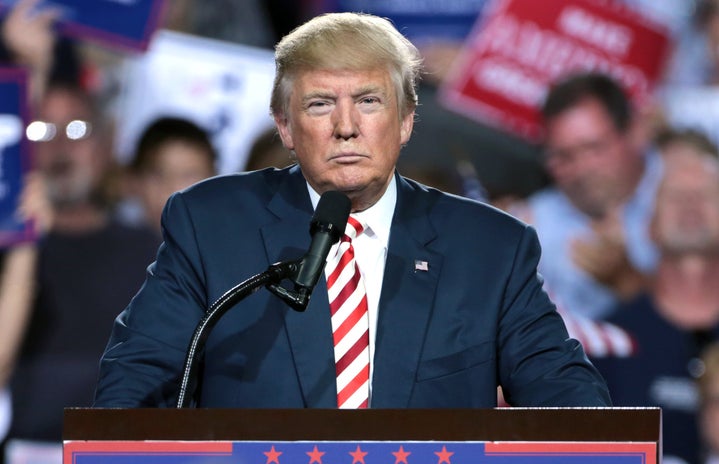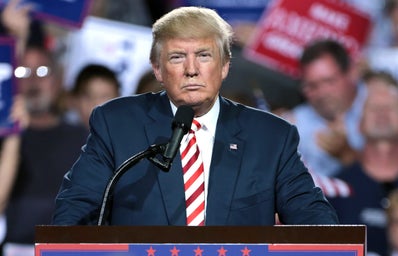Another four of Trump and a republican trifecta. What will it look like?
Economic Policies:
The core of Trump’s tax plan is to expand allocations distributed in the “Tax Cuts and Jobs Act of 2017,” which is set to expire in 2025. The TCJA cut taxes for shareholders as well as individual taxpayers. He also plans to provide deeper tax cuts for select individuals but mostly businesses, lowering the corporate tax rate from 21% to 15%. If Trump is able to achieve these tax plans there would be a decrease in personal income tax for everyone but high-income households would be better benefitted.
For example, a middle-class family earning $80,000 a year would get a $1,740 tax break in 2026. In contrast, a household earning $14 million a year would get a $376,910 tax break.
Although inflation is currently close to the Federal Reserve’s annual goal of 2%, many Americans see it as their number one issue. Prices remain high but the low inflation rate represents that prices are rising significantly more slowly than during pandemic times.
Trump plans to put a 10% tax on all imports and 60% or more on Chinese imports which could add $1,700 annually to every middle-class household. This plan could increase inflation from it’s current 2.6% to 3.4%.
New Appointments:
With Trump’s upcoming second term, his cabinet and key appointments are expected to reflect his “America First” agenda. Notable names floated for leadership roles include Stephen Miller, a staunch immigration policy advocate, and Jeffery Clark, a controversial figure tied to the Justice Department’s investigations into the 2020 election. Additionally, Trump has hinted at appointing individuals like Kash Patel, known for his loyalty and focus on dismantling perceived “deep state” institutions.
A notable addition to his administration would be the creation of the new “Department of Government Efficiency”, aimed at streamlining federal operations and reducing bureaucracy. This department would reportedly be led by entrepreneur Elon Musk and tech entrepreneur-turned-politician Vivek Ramaswamy. Musk would bring a private-sector approach to addressing government inefficiencies. Meanwhile, Ramaswamy’s emphasis on reducing regulatory burdens aligns with Trump’s vision for minimizing the federal footprint. Together they are expected to push for significant restructuring of federal agencies, emphasizing privatization, deregulation, and cost-cutting initiatives.
The Trump administration is likely to prioritize appointees who align closely with his vision of reducing federal oversight, restructuring bureaucracies, and amplifying executive authority. This approach would continue to challenge the traditional norms of governance, creating a cabinet heavily weighted toward personal loyalty rather than broad bipartisan expertise.
Republican Majority:
With a “Republican Trifecta” achieved in Washington (the Republican control of the House, Senate, and Presidency) Trump has the power to advance an aggressive right-wing agenda with limited opposition. Key legislative priorities may include making the 2017 tax cuts permanent, implementing stricter immigration laws, and curbing federal spending on social programs. The Republican-controlled Congress would likely repeal portions of the Inflation Reduction Act, including provisions aimed at renewable energy expansion, while bolstering fossil fuel industries.
A Republican-majority in the Senate could streamline judicial confirmations, allowing Trump to appoint more conservative judges to federal courts. These appointments would leave a lasting impact, solidifying a rightward shift in the judiciary that could influence policy decisions on issues like abortion, gun rights, and voting laws for decades.
Social Policies:
Trump’s Social policies for 2024 emphasize rolling back federal involvement in education and healthcare. He has proposed dismantling the Department of Education, leaving states with greater control over curriculum and funding. With healthcare, Trump seeks to repeal the Affordable Care Act, despite previous attempts being met with resistance even from within his party.
Other key focuses include a federal abortion ban after 15 weeks, targeting transgender rights through bans on gender-affirming care for minors, and restricting LGBTQ+ representation in schools. These policies reflect a broader cultural strategy aimed at mobilizing his conservative base, even as they face potential legal and social pushback.
Climate Policies:
Trump’s climate agenda centers on reversing Biden-era policies and championing fossil fuel development. He has vowed to expand drilling on federal lands, revive coal production, and withdraw environmental regulations he deems restrictive for businesses. The Trump administration’s prior withdrawal from the Paris Agreement and resistance to international climate commitments suggests that global cooperation on climate initiatives would remain minimal.
Additionally, repealing tax credits and subsidies for renewable energy projects is a priority under Trump’s plan. Critics warn that this approach would stall the progress made in transitioning to a low-carbon economy, increase greenhouse gas emissions, and hinder the U.S.’s ability to meet international climate goals. However, supporters argue it would provide a short-term economic boost to traditional energy sectors and reduce energy costs for consumers.
—
This outlook on Trump’s policies offers a glimpse into the potential direction of the country under another term, particularly if paired with Republican control of Congress. From economic reforms to climate action — or lack thereof — the consequences of these policies will depend heavily on the balance of power and the resilience of opposing institutions.


